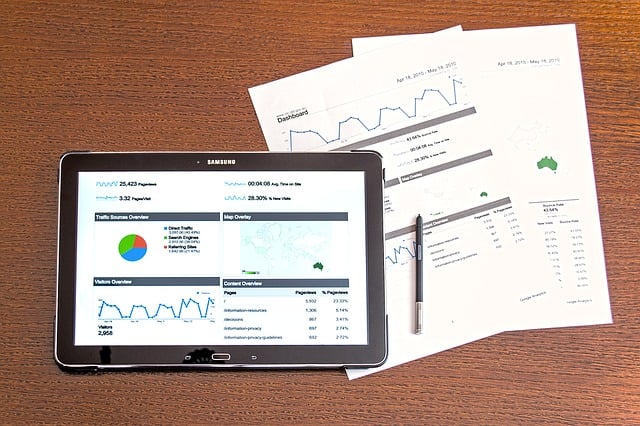2 Ways To Keep Your Website Traffic Growing No Matter What!
by Will Williamson on 19-Sep-2022 10:00:00
If the last few years have taught us anything, it’s that the economic, social, and political landscape
can change extremely quickly. The fortunes of individual businesses fluctuate, too, with even the
most successful companies having years that are better than others. Despite this turbulence,
however, the importance of the Internet for business sales and service delivery has grown
consistently year on year.
Wherever there are people, there are sales to be made. The key to capitalising on the growth of the
online marketplace is, therefore, to ensure a steady and consistent increase in website traffic,
whatever the external circumstances or the current position of your business.
This article explains two evergreen web traffic growth strategies with a low entry cost and proven
results for small businesses: SEO and PPC.
SEO: Search Engine Optimisation
Search engine optimisation is probably the most famous digital marketing strategy, and involves
improving your website’s search rank on Google and other search engines for target keywords, or
search phrases. As people rarely look much further than the top few results on the first page, getting
yourself on the first page of Google is the gold standard for SEO, and preferably to sustain a position
in the top three results for multiple key phrases.
Active SEO is necessary because high rankings don’t happen on their own. Google’s search
algorithms are constantly assessing and reassessing the relative position of websites based on their
perceived relevance to search queries, and their domain authority.
Left unattended and un-updated, a webpage would steadily lose search position for target keywords
as its relevance decreased. With this drop in visibility comes decreased web traffic, so to keep your
traffic growing at a consistent rate you will need to invest in SEO long-term – and not stop when you
reach number one.
SEO is an effective growth strategy for businesses during a recession or time of uncertainty because
it is affordable, flexible, and inherently scalable. And although there are technical aspects to SEO
that can affect your rankings – including page loading time, meta tags, XML site maps, and inbound
backlinks – the best strategy for improving your search position is to invest in regular and relevant
content to address the search queries of your target personas.
How to keep your content and keywords relevant
Online content, in the form of good sales-focused web copy, regular blog articles, and expert guides,
will help you secure a good Google search position, attract traffic to your site, and boost
conversions. However, the needs, worries, and motivations of your buyer personas are not static. If
you use the same keywords and content angles year in year out, you may find a drop in traffic due to
your content losing real world relevance to your buyer personas. Consistent growth, therefore,
involves regular keyword research and re-evaluations of your persona groups and their priorities, in
order to continue to produce hard-hitting and relevant content.
High Google search positions will follow from this because strong website traffic creates a virtuous
cycle in which Google assumes that a well visited page has high keyword relevance and authority –
thus awarding a higher search position and attracting more web traffic, and so on.
PPC: Pay Per Click Advertising
SEO can be conducted on almost any budget. While most businesses find it most effective to
outsource content creation to a marketing specialist versed in SEO writing, it is possible to do this in
house if you have the time and expertise to spare.
Pay Per Click (PPC) advertising, on the other hand, does require a sustained investment to yield good
results. If you’re looking for consistent web traffic growth whatever the weather, using PPC
alongside SEO will optimise the value of your advertising budget while giving you maximum
exposure for your target keywords.
PPC is essentially a form of sponsored search, in which a landing page is given prominence on the
Google search engine results pages (SERPs) for specified keywords in exchange for a payment per
click. The more competitive the keyword, the greater the cost. PPC content still has to be high
quality and relevant, as low-yielding content will attract a higher cost per click. Any business can
engage in PPC through Google Ads, but most find it beneficial to work with a PPC management
company or marketing agency to monitor their campaign results and ensure they are getting the
best results from their budget.
The advantage of PPC advertising is the chance it gives you to secure ‘quick win’ sales while your
cumulative investment in content marketing provides long-term benefits through SEO. It’s an
excellent way of boosting web traffic in response to an emerging need by addressing trending
concerns among your buyer personas, or for increasing brand awareness around a product launch or
event. You can also use PPC to reinforce your evergreen content, by targeting traffic towards specific
pages of your website, thereby sustaining your web traffic levels in the face of high competition.
Next steps
To find out more about web traffic optimisation strategies and which approaches are best suited to
the needs of your business and its personas, please call JDR today on 01332 343281.
Image Source: Unsplash
- Inbound Marketing (SEO, PPC, Social Media, Video) (832)
- Strategy (368)
- Sales & CRM (197)
- Marketing Automation & Email Marketing (192)
- Business Growth (168)
- Website Design (162)
- Hubspot (141)
- Lead Generation (117)
- Google Adwords (100)
- Content Marketing (94)
- Conversion (53)
- Case Studies (49)
- News (47)
- Ecommerce (39)
- Webinars (36)
- SEO (27)
- AI (21)
- Events (19)
- LinkedIn Advertising (17)
- Video (17)
- Video Selling (15)
- Software training (13)
- Niche business marketing (11)
- The Digital Prosperity Podcast (10)
- Facebook Advertising (8)
- HubSpot Case Studies (7)
- Web Design Case Studies (1)
- February 2026 (9)
- January 2026 (12)
- December 2025 (15)
- November 2025 (6)
- October 2025 (17)
- September 2025 (16)
- August 2025 (14)
- July 2025 (14)
- June 2025 (5)
- May 2025 (19)
- April 2025 (15)
- March 2025 (13)
- February 2025 (13)
- January 2025 (8)
- December 2024 (2)
- November 2024 (4)
- October 2024 (21)
- September 2024 (4)
- August 2024 (8)
- July 2024 (14)
- June 2024 (16)
- May 2024 (25)
- April 2024 (15)
- March 2024 (18)
- February 2024 (5)
- January 2024 (10)
- December 2023 (6)
- November 2023 (10)
- October 2023 (13)
- September 2023 (12)
- August 2023 (14)
- July 2023 (13)
- June 2023 (14)
- May 2023 (15)
- April 2023 (13)
- March 2023 (14)
- February 2023 (13)
- January 2023 (15)
- December 2022 (13)
- November 2022 (6)
- October 2022 (8)
- September 2022 (22)
- August 2022 (15)
- July 2022 (13)
- June 2022 (16)
- May 2022 (14)
- April 2022 (16)
- March 2022 (17)
- February 2022 (11)
- January 2022 (8)
- December 2021 (6)
- November 2021 (7)
- October 2021 (11)
- September 2021 (10)
- August 2021 (7)
- July 2021 (7)
- June 2021 (4)
- May 2021 (4)
- April 2021 (1)
- March 2021 (3)
- February 2021 (5)
- January 2021 (4)
- December 2020 (7)
- November 2020 (6)
- October 2020 (5)
- September 2020 (9)
- August 2020 (18)
- July 2020 (17)
- June 2020 (17)
- May 2020 (10)
- April 2020 (21)
- March 2020 (24)
- February 2020 (21)
- January 2020 (12)
- December 2019 (23)
- November 2019 (12)
- October 2019 (14)
- September 2019 (16)
- August 2019 (15)
- July 2019 (13)
- June 2019 (6)
- May 2019 (8)
- April 2019 (4)
- March 2019 (2)
- February 2019 (2)
- January 2019 (2)
- December 2018 (3)
- November 2018 (24)
- September 2018 (11)
- August 2018 (9)
- June 2018 (3)
- May 2018 (6)
- April 2018 (14)
- March 2018 (12)
- February 2018 (16)
- January 2018 (15)
- December 2017 (15)
- November 2017 (18)
- October 2017 (23)
- September 2017 (19)
- August 2017 (28)
- July 2017 (27)
- June 2017 (25)
- May 2017 (18)
- April 2017 (17)
- March 2017 (16)
- February 2017 (17)
- January 2017 (14)
- December 2016 (21)
- November 2016 (27)
- October 2016 (25)
- September 2016 (16)
- August 2016 (20)
- July 2016 (19)
- June 2016 (14)
- May 2016 (20)
- April 2016 (24)
- March 2016 (22)
- February 2016 (28)
- January 2016 (27)
- December 2015 (28)
- November 2015 (19)
- October 2015 (9)
- September 2015 (12)
- August 2015 (5)
- July 2015 (1)
- June 2015 (10)
- May 2015 (3)
- April 2015 (11)
- March 2015 (14)
- February 2015 (15)
- January 2015 (12)
- December 2014 (2)
- November 2014 (23)
- October 2014 (2)
- September 2014 (2)
- August 2014 (2)
- July 2014 (2)
- June 2014 (7)
- May 2014 (14)
- April 2014 (14)
- March 2014 (7)
- February 2014 (2)
- January 2014 (7)
- December 2013 (9)
- November 2013 (14)
- October 2013 (17)
- September 2013 (3)
- August 2013 (6)
- July 2013 (8)
- June 2013 (4)
- May 2013 (3)
- April 2013 (6)
- March 2013 (6)
- February 2013 (7)
- January 2013 (5)
- December 2012 (3)
- November 2012 (2)
- September 2012 (1)
Subscribe by email
You May Also Like
These Related Blogs

How To Understand Your Customer More In Order To Increase Website Conversions
When have you looked at a newspaper ad, related with it and forgotten about it the next day? If you're anything like me, I'm assuming every time. Howe …

How To Increase Your B2B Website Conversion Rate - 10 Quick Fixes
As every Director of a B2B company knows, increasing your website conversion rate is the holy grail of a business' success. Convert more visitors into …

Your Website Conversion Checklist – A FREE Guide To Help Increase Website Conversions
Ever wondered how to increase your website conversions the fool proof way? Sure, there are lots of different tips and tricks you can try to raise your …




